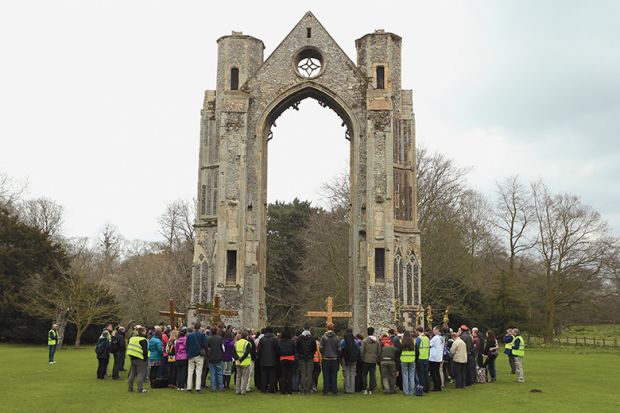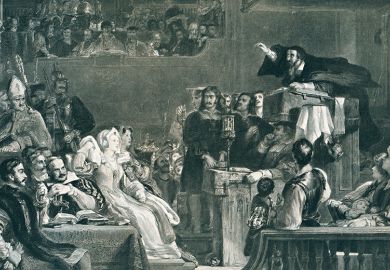In one of the essays collected here, Eamon Duffy writes that the Reformation historian A. G. Dickens thought that “late medieval Christianity was ailing and played out, and that as a result it had died on its feet. To some of us…it looks rather as if it had those feet shot out from under it.”
Duffy is among those rare historians whose research has completely reoriented their field. His wonderful books, notably The Stripping of the Altars: Traditional Religion in England, 1400-1580 (1992), successfully challenged simple accounts of the English Reformation as a liberation, personal and national, from superstition and the obfuscations of corrupt and worldly priests; stressing instead enduring commitment to the worship and rituals of the Catholic church. His judgement is here signposted in the title, and elaborated in essays on aspects of the Reformation itself, alongside chapters on its later representation in history books and historical novels, and through the re-establishment of Walsingham in Norfolk as a pilgrimage site.
Many chapters began as addresses to wide audiences; Duffy is an accomplished essayist, combating in witty prose a Protestant narrative that still lingers among a broader reading public. He deplores the monks of Ely “signing away a millennium of Christian history in return for their pensions”, and describes one of Dickens’ minor works as “purest tosh”. The pieces are at once accessible and imaginatively researched; entertaining, yet always with serious purpose.
All are worth reading, but only one or two can be highlighted here. Duffy’s essay on the ineffective and brutally suppressed 1569 Northern Rising demonstrates renewed enthusiasm for Catholic worship, for holy water and rosary beads, with an attention to material culture as well as to the written record typical of his work. A modest monument in Durham Cathedral prompts a reflective conclusion. This commemorates John Brimley, who survived as choirmaster there for 40 years, despite participation in the Rising, and his remaining might be seen as a “symbol of harmonious continuities”, though it really represents “an erasure of memory, veiling the murderous political and religious animosities” of the period.
The longest essay addresses historical novels. Readers are unlikely to seek out R. H. Benson’s Come Rack! Come Rope! (1912), a “complicated romance” between Catholics in Elizabethan England, or the implausible rehabilitation of Henry VIII’s fifth wife by Ford Maddox Ford. But in Duffy’s view, too many are convinced by Hilary Mantel’s Wolf Hall trilogy (2009-20): her portrait of Thomas Cromwell is anachronistic, giving him the virtues of “twenty-first-century Islington”, while her account of Thomas More is unfair. More was neither a torturer (although Cromwell was) nor a sexually frustrated misogynist.
Mantel is criticised not just for poor history but for helping to bring the Catholic church into disrepute. Duffy is himself a prominent and not uncritical member of the church, adviser to popes and historian of the papacy. He offers perceptive, critical accounts of “Protestant” historians such as Dickens or James Anthony Froude, but is perhaps, like all of us, less prone to interrogate his own perspectives. In an essay on German Catholic views of Luther, Duffy has an illuminating discussion of the contributions of scholars “without overt religious commitments”. In enjoying this rich collection, his own readers too can ponder the strengths and weaknesses of confessionally informed religious history.
Ann Hughes is professor of early modern history, emerita, at Keele University.
A People’s Tragedy: Studies in Reformation
By Eamon Duffy
Bloomsbury, 272pp, £20.00
ISBN 9781472983855
Published 26 November 2020
Register to continue
Why register?
- Registration is free and only takes a moment
- Once registered, you can read 3 articles a month
- Sign up for our newsletter
Subscribe
Or subscribe for unlimited access to:
- Unlimited access to news, views, insights & reviews
- Digital editions
- Digital access to THE’s university and college rankings analysis
Already registered or a current subscriber?








